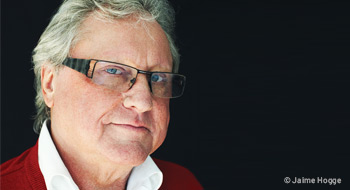

Bill Wilkerson’s career has been a series of accidents, he says, starting with the day he was expelled from high school for starting a water balloon fight during his senior year, in 1962. “My mother figured I was going to jail for sure,” he jokes.
His mother didn’t need to worry. Far from adopting a life of crime, Wilkerson went on to become an award-winning advocate for mental health, thanks to his work with the Global Business and Economic Roundtable on Addiction and Mental Health, of which he is co-founder, chair and CEO.
How Wilkerson got to where he is today, though, is a long and winding road. Because he was expelled from high school, he never attended college or university. Instead, he went straight into the workforce, landing a position as a police reporter for the Welland Evening Tribune. From there, his career veered in multiple directions—from chief of staff for the mayor of Toronto, to business advisor and spokesperson for the NHL. “That really was my university education.”
In 1995, Wilkerson was named president of Liberty Health (now Manulife Financial)—a role that would lead him to the field of mental illness. While working with the insurance company, Wilkerson observed that prescriptions for little-understood ailments such as insomnia and chronic pain were on the rise. At the same time, in 1996, the Harvard School of Public Health released its Global Burden of Disease study, which found that psychiatric illness was rapidly becoming the leading cause of disability. That study would become the inspiration for the Roundtable’s creation.
In 1998, with the support of former Finance Minister Michael Wilson, Wilkerson launched the Roundtable as an informal think tank designed to provide information on mental health and its connection to the workplace, business and overall economy. As the Roundtable’s lead, Wilkerson worked closely with major corporations, governments (as employers) and law enforcement agencies. He is also still a prominent speaker on mental health issues in Canada and the U.S.
One of the major problems for those suffering from mental illness in the workplace, he says, is that the current system—particularly when it comes to long-term disability—fails to provide sufficient support. “It’s a no man’s land,” he says.
What’s more, the relationship between the employee and employer often becomes adversarial rather than supportive. “It’s like [employers] have lost hope in you.”
Wilkerson suggests that employers adopt an “employee renewal process” that takes a collaborative and personalized approach to disability and overall well-being. “Instead of looking at someone as sick or ill, you’re looking at someone who’s at a point where something requires a reassessment to bring about a renewal,” he says.
His goal is to see a workplace culture in Canada that nurtures employee well-being. “We have to see our people as assets, and we have to invest in and manage these assets.”
Though Wilkerson has been honoured with numerous awards for his work, he says the personal stories he hears have been the most rewarding—for example, emails from strangers thanking him for shining a spotlight on mental illness.
Though the Roundtable’s activities officially ended in 2011, Wilkerson says more work needs to be done, and he plans to find a successor who can keep the momentum going when he retires.
“Mental health is the loneliest of underdog issues, but it’s not a lost cause.”
Tammy Burns is associate editor of BenefitsCanada.com. tammy.burns@rci.rogers.com
Get a PDF of this article.
